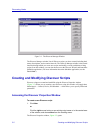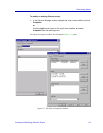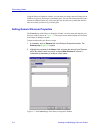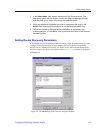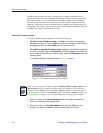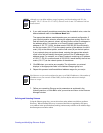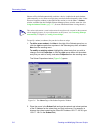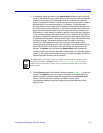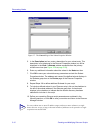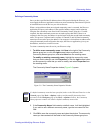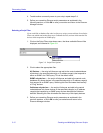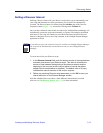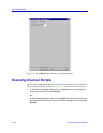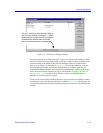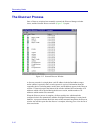
Creating and Modifying Discover Scripts 3-9
Discovering Nodes
3. If necessary, place the cursor in the Subnet Mask field and type the subnet
mask for the subnet that you wish to discover. Note that the value set here will
determine the number of IP addresses which are included in the defined
subnet, regardless of whether or not this value correctly reflects the number of
devices each of your subnets contains. For example, a Class B network
typically defines the third byte of the IP address as the subnet identifier, and
the fourth byte as the host identifier. In this kind of network, each subnet (as
defined by each possible value of the third byte) can contain a maximum of
256 nodes on it (the number of possible values for the fourth byte). However,
if you incorrectly identify the subnet mask for such a network as 255.255.0.0,
the discover application interprets this to mean that each subnet has 65,536
IP addresses (256 possible values of the third byte, times 256 possible values
for the fourth byte). Since each discover script is limited to querying a
maximum of 2000 addresses, this kind of incorrect mask setting would
prevent you from completing your script. By default, the Subnet Mask will be
set to 255.255.255.0, limiting the size of the subnet to a maximum of 256
devices. The Nodes field just below the Subnet Mask field indicates the
number of nodes the Discover application understands your defined subnet to
contain; it will update once you have saved your subnet changes, closed the
Subnet Properties window, and re-opened it.
4. On the General page of the Subnet Properties window (Figure 3-7), place the
cursor in the Name text box, and type in a name for your subnet entry. By
default, manually-created subnets are assigned the name New Subnet X,
where X will increment as necessary to create a unique name.
Automatically-created subnets are assigned the subnet address as their
default name.
NOTE
The Nodes field in the Subnet Properties window is not the same as the nodes value
displayed in the View—>Subnets window (see Figure 3-20, page 3-28); that value
indicates the actual number of nodes in the central node database that reside on the
defined subnet.




